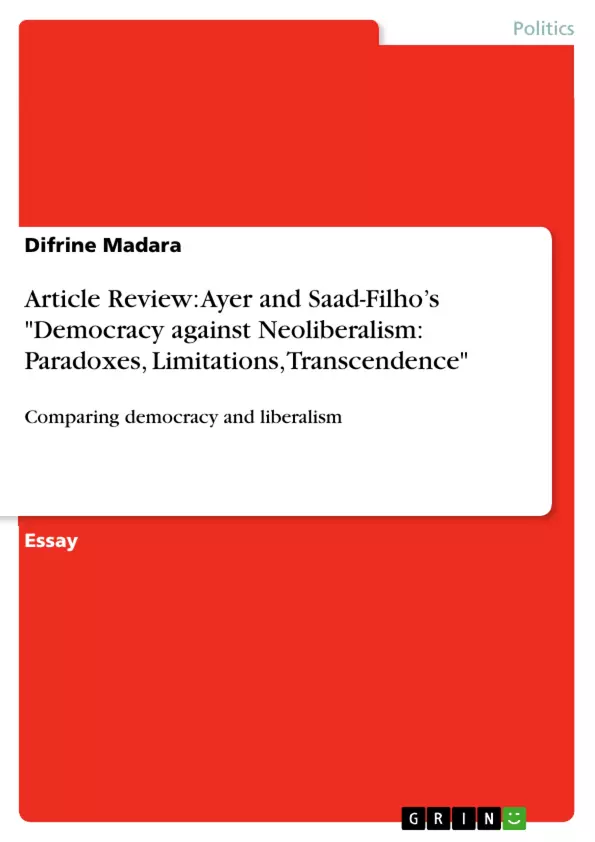Democracy and liberalism advocates for the protection of human rights and individual liberties. For instance, a democratic society offers a platform for people to grow through fair participation in economic, political and social activities thus enhancing their ability to have full control of their futures (Saad-Filho, 2010). Based on the conventional model, some of the main elements of democracy include respecting the rule of law, conducting credible multiparty elections, good governance, market economy and pluralist civil society (Ayers and Saad-Filho, 2015). On the other hand, neoliberalism is associated with the rise of the Weber-Schumpeter-Dahl model, which fused political, and market-oriented tendencies thus leading to illiberal policies in relation to personal, and civil liberties, privacy rights, and collective actions, among others. As a result, Biebricher (2015) argued that neoliberalism is the cause of crises in democracy. That is, neoliberals use corrupted conventional tools of representation and public administration to push for self-interests (Ayers and Saad-Filho, 2015). In this article, Ayers and Saad-Filho explained the concept of neoliberal democracy and highlighted its paradoxes, limitations, and transcendence. Therefore, in this essay, the author review and critique the findings of Ayers and Saad-Filho.
Inhaltsverzeichnis (Table of Contents)
- Introduction
- Review and Critique
- Neoliberalism, Democracy, and the Rise of the Market Economy
- The Effects of Neoliberal Policies on Social Welfare
- The Impact of Neoliberalism on Political Structures and Freedoms
- Conclusion
Zielsetzung und Themenschwerpunkte (Objectives and Key Themes)
This article review examines the relationship between neoliberalism and democracy by analyzing the article "Democracy against Neoliberalism: Paradoxes, Limitations, Transcendence" by Ayers and Saad-Filho. The review aims to understand the complex interplay between these ideologies, exploring their potential benefits and inherent contradictions.
- The impact of neoliberalism on the quality and sustainability of democracy.
- The tensions between individual liberties and market-oriented policies within a neoliberal framework.
- The challenges of promoting social welfare and addressing economic inequality in a neoliberal context.
- The consequences of neoliberal policies on political structures, freedoms, and legitimacy.
- The potential limitations of capitalism as a means of production in relation to democracy.
Zusammenfassung der Kapitel (Chapter Summaries)
- Introduction: The introduction establishes the context by defining key concepts such as democracy, liberalism, and neoliberalism. It highlights the potential conflicts and paradoxes arising from the intersection of these ideologies.
- Review and Critique: This section analyzes the article's main arguments, examining the impact of neoliberalism on democracy and its implications for social welfare, political structures, and individual liberties.
Schlüsselwörter (Keywords)
This article review focuses on the interrelationship between neoliberalism and democracy, analyzing the consequences of neoliberal policies on political structures, social welfare, and individual freedoms. Key themes include the rise of the market economy, the limitations of representative democracy under neoliberal conditions, the challenges of addressing social inequality, and the potential contradictions between market-oriented policies and democratic values.
Frequently Asked Questions
What is the main conflict between neoliberalism and democracy?
Neoliberalism often prioritizes market-oriented policies and self-interest, which can lead to illiberal policies that restrict collective action and social welfare, undermining democratic values.
How does neoliberalism affect social welfare?
Neoliberal policies often lead to increased economic inequality and challenges in addressing social needs, as the focus shifts toward market efficiency rather than public support.
What are the paradoxes of a "neoliberal democracy"?
The paradox lies in using democratic tools of representation to push for private interests that may actually limit the freedoms and participation of the general public.
Who are Ayers and Saad-Filho?
They are the authors of the analyzed article who explore the limitations and transcendence of democracy within a neoliberal framework.
Can capitalism and democracy coexist perfectly?
The review critiques this relationship, highlighting that the market economy can sometimes create structures that hinder true democratic legitimacy and social equality.
- Quote paper
- Difrine Madara (Author), 2019, Article Review: Ayer and Saad-Filho’s "Democracy against Neoliberalism: Paradoxes, Limitations, Transcendence", Munich, GRIN Verlag, https://www.grin.com/document/504121



